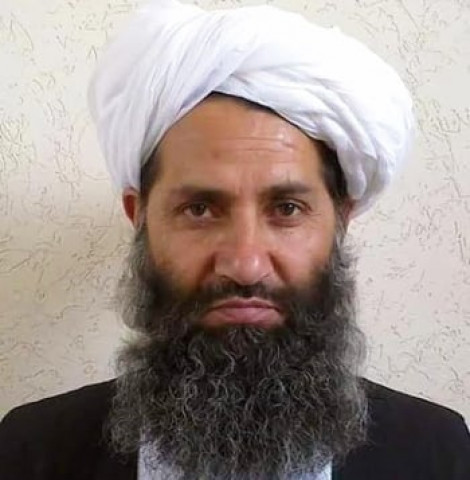Analysis: Afghanistan’s fate after Mullah Mansour
In an ideal world, Taliban must be terrified and begging for President Obama’s mercy and President Ghani’s amnesty

Afghan Islamic Press releases photograph of new Afghan Taliban chief Mullah Haibatullah Akhundzada
Washington and Kabul have both been condemning the Taliban of belligerence while participating in meetings of the Quadrilateral Coordination Group (QCG). Mansour is said to have relied on violence to strengthen his grip on the militia after Mullah Omar’s death.
Things should be better now after Washington’s favourite war-toy realised ‘the important milestone’. In an ideal world, Taliban must be terrified and begging for President Obama’s mercy and President Ghani’s amnesty. Of the 9,800 US military personnel, 5,500 must be rejoicing on prospects of drawing down from Afghanistan in 2017. True to the spirit of the Nobel Peace Prize, its proud recipient in the White House is dutifully ending America’s longest war. What a great difference Pentagon’s one drone strike can make against the bad guys, conclude cable TV analysts in the post-Mansour world.
Analysis: What can Pakistan do right in the face of India’s growing military might
Shocking reality check
Alas, it’s not an ideal world. The US cable TV channels spent only a couple of hours eulogising the Obama administration for taking the elusive militant out and condemning Pakistan for extending citizenship to him. Beyond that the uncertainty persists, even worsens. Largely touted as ‘non-controversial’ within Taliban’s other sub militias, Haibatullah Akhundzada’s first audio message set the record straight. The White House unquestionably banks on the doctrine of regime change.
The outgoing US administration needs a miracle to leave behind an Afghanistan better than the one it inherited. The ‘unity’ government in Kabul is riddled by power-sharing disputes and remains deeply unpopular. Afghan security forces lack conviction and capability, alike. The biggest litmus test ahead for Ghani-Abdullah will be the same old one: Secure Kabul from militant attacks. So far it has proven to be a massive undertaking for the parties involved, Afghans and the Americans both.
Pakistan, meanwhile, is pocketing its share of embarrassment for providing the fireproof citizenship card and passport. Islamabad is furious at the US and at Afghanistan for its lack of reaction towards Iran, where allegedly Mansour’s family resides and also where the Taliban have long enjoyed safe havens.
Analysis: Impact of 9/11 victims' families lawsuit against Saudi Arabia
Prior to ordering the killer drone strike, Washington may have pondered that it may mean end to parleys with the militia until it’s weakened enough to bow down. It might as well have concluded that Islamabad is not an ally, thus the Hellfire missile left its mark on its soil.
Where do we go from here?
Pakistan has to choose a more pragmatic response over a reactive one. How many more Taliban commanders still carry its citizenship cards and with what names? The Iran-Pakistan border security and Tehran’s role have been further flagged in red for the general headquarters in Rawalpindi. While Premier Nawaz Sharif is vacationing in the UK, the army chief termed the May 22 drone strike in Balochistan as detrimental to bilateral relations. The US ambassador’s response is anybody’s guess.
Pakistan will continue to pursue the objective in close consultation with Afghanistan Government and other members of the QCG,” said Sartaj Aziz, prime minister’s advisor on foreign policy, on Thursday. The forum may survive the tremors but its efficacy deficit is set to worsen further. The US damage-control efforts while bullying Pakistan will have consequences for bilateral relations too.
Mullah Fazalullah, the mastermind behind the attack on Malala Yousafzai, meanwhile remains at large in Afghanistan. What are the odds of locating and eliminating him? Is he an alleged asset for Washington and Kabul just like Mullah Mansour is said to be for Islamabad?
Afghanistan has more external players than Pakistan and the US. With Iran and India engaged in a not-so-covert power play, and China hungry for minerals exploration and investment, the insurgency is anything but manageable beyond May 22.
Whatever influence Pakistan assumed to have had on Afghan Taliban has diminished with the elimination of Mansour. Seemingly, Kabul may have to deal with militia in the battlefield and negotiation table all by itself (whenever the moment arrives). Ad interim, Islamabad can continue fencing its border with Afghanistan and eventually with Iran too. Amidst the hullabaloo, life of Afghan refugees in Pakistan will surely be more difficult as they’ll be required to head home, sooner than later.
Many analysts believe Obama fails when it comes to strategy. With no dearth of examples, here he did it again. He will leave behind a messier and bloodier Afghanistan for his successor, which isn’t good news at all for Afghans. The Tea Party favourite, Hillary Clinton, isn’t absolved of the mess in Libya to name one example. The inexperienced but rash Donald Trump is not best known for compromise and statesmanship.
Naveed Ahmad is a Pakistani investigative journalist and academic with extensive reporting experience in the Middle East and North Africa. He is based in Doha and Istanbul. He tweets @naveed360





1724319076-0/Untitled-design-(5)1724319076-0-208x130.webp)













COMMENTS
Comments are moderated and generally will be posted if they are on-topic and not abusive.
For more information, please see our Comments FAQ